Destiny Library Catalog - http://destiny.collier.k12.fl.us
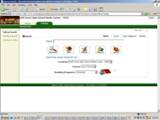 Destiny is Collier School's online library catalog. It identifies every item in each school's media center collection.. It is available from every school computer and from home. Destiny can be searched using Keyword, Title, Author, Subject, Series, or by Advanced Search. Destiny is Collier School's online library catalog. It identifies every item in each school's media center collection.. It is available from every school computer and from home. Destiny can be searched using Keyword, Title, Author, Subject, Series, or by Advanced Search.
Destiny users can also search for materials in other Collier School libraries by using the drop down arrow on the search page.
Use Destiny
- to find out what books or videos the library has on your topic
- to find where a specific item is located in the library
Back |
Books

Books cover virtually any topic, fact or fiction. For research purposes, you will probably be looking for books that synthesize all the information on one topic.
Libraries organize and store their book collections on shelves called "stacks." Many books are also available electronically on the Web (e-books).
|
Use a Book
- when looking for a lot of information on a topic
- to put your topic in context with other important issues
- to find historical information
- to find summaries of research to support an argument
Examples
Newman, Shirlee P. Child Slavery in Modern Times. New York: Franklin Watts, 2000. Print
Brill, Marlene Tarq. Women for Peace. New York: Franklin Watts, 2008. Print.
Back
|
Online Databases -- CCPS Online Resources
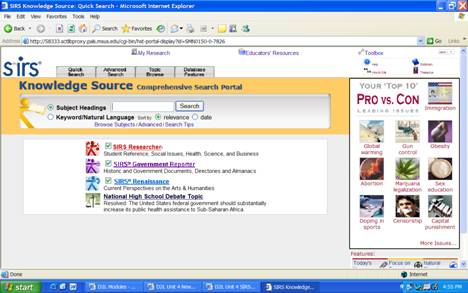
Online Databases include articles in magazines, journals and newspapers on a wide variety of topics, easily searched using Keyword and Subject searches. Most articles are full text, containing the whole article as it originally appeared in the periodical.
|
Use an Article Index
- when you want to find articles on your topic in magazines, journals or newspapers
Examples of Article Indexes
Student Resources in Context (a general article index)
Opposing Viewpoints in Context (an index to articles about social issues)
Health and Wellness Resource Center and Alternative Health Module (an index to issues of health and medicine)
Academic OneFile (an index to scholarly journals)
SIRS Government Reporter (an index to the documents of the U. S. Government)
Back |
Internet
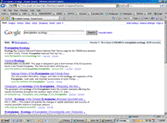 The Internet allows the researcher to quickly access information on every imaginable topic through a browser, such as Internet Explorer, Firefox, or Google Chrome, using a search engine such as Google or Bing. The Internet allows the researcher to quickly access information on every imaginable topic through a browser, such as Internet Explorer, Firefox, or Google Chrome, using a search engine such as Google or Bing.
It is important to be a careful researcher on the Internet, only using information from sites that are accurate and authoritative.
Anyone can post to the Internet. There is no editorial process as in magazines, journals, and databases, and not all internet postings are true or reliable.
|
Use the Web
- to find current information
- to link to information provided by the library over the Internet
- to find information about companies
- to find information from all levels of government - federal to local
- to find both expert and popular opinions
Examples of Web Addresses
Back
|
Popular Magazines
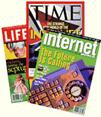 Popular magazines publish articles on topics of interest and current events. The articles are written by journalists and are for the general public. Magazines have an editorial board that selects and assembles the articles for publication. Popular magazines publish articles on topics of interest and current events. The articles are written by journalists and are for the general public. Magazines have an editorial board that selects and assembles the articles for publication.
Magazines, like journals and newspapers, are called "periodicals" because they are published at regular intervals throughout the year. You can find print magazines at newsstands and in libraries. Many are also available on the Web as electronic magazines.
|
Use a Popular Magazine
- to find information or opinions about popular culture
- to find up-to-date information about current events
- to find general articles written for people who are not necessarily specialists in the topic area
Examples of Popular Magazines
U.S. News and World Report
Wired
Business Week
Advertising Age, a trade magazine
Back |
Scholarly Journals
 Journal articles are written by scholars in an academic or professional field. An editorial board made up of professionals in the field reviews articles to decide if they should be published. Journal articles may cover very specific topics or narrow fields of research, and research articles are held to exacting standards of research methods. Journal articles are written by scholars in an academic or professional field. An editorial board made up of professionals in the field reviews articles to decide if they should be published. Journal articles may cover very specific topics or narrow fields of research, and research articles are held to exacting standards of research methods.
Since journals are published at periodic intervals, they are grouped in the category called "periodicals." They may be in print format or on the Web as electronic journals. Your school district and library purchase subscriptions to print and online journals.
|
Use a Journal
- when doing scholarly research
- to find out what has been studied on your topic
- to find bibliographies that point to other relevant research
Examples of Journals
Journal of Communication
The Historian
Journal of Business Research
Lancet
Back |
Encyclopedias
 Encyclopedias contain factual articles on many subjects. Encyclopedias contain factual articles on many subjects.
Encyclopedias are available in print sets and also online (World Book, Grolier).
There are two types of encyclopedias — general and subject. General encyclopedias provide overviews on a wide variety of topics.
Subject encyclopedias contain entries focusing on one field of study.
|
Use an Encyclopedia
- when looking for background information on a topic
- when trying to find key ideas, important dates or concepts
Examples
Encyclopedia of Major Marketing Campaigns (subject encyclopedia)
World Book Encyclopedia (general encyclopedia)
Back |
Newspapers
 Newspapers provide articles each day about current events and are a good source for local information. Newspapers provide articles each day about current events and are a good source for local information.
Newspapers, like journals and magazines, are called "periodicals" because they are published regularly, or periodically.
Most newspapers are published daily in print and and online.
Our local paper, the Naples Daily News, is available to all students and teachers through Angel.
|
Use a Newspaper
- to find current information about international, national and local events
- to find editorials, commentaries, expert or popular opinions
Examples
New York Times
Washington Post
Wall Street Journal
Naples Daily News
Ft. Myers News Press
Back |
Primary Sources
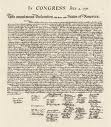
Primary sources are original historical documents, artwork, photographs
or speeches created by people who lived during the time.
Primary sources describe or illustrate events and experiences. They provide
first-hand information about an event or time period.
Use Primary Sources
- to find information about a period from the people who lived during the time
- to get first-hand experience about a person or event.
Examples of Primary Sources:
Diaries
Letters
Reports
Photographs
Newspaper articles
Available at the Library of Congress American Memory Collection
Back
|
|









